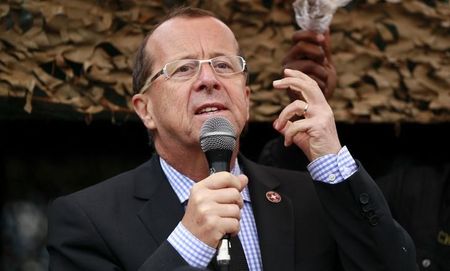Head of U.N. Congo peacekeepers regrets failing to stop massacre

KINSHASA (Reuters) – The head of the U.N. peacekeeping mission in the Democratic Republic of Congo has said he is sorry his forces reacted too slowly to prevent a massacre in the east of the country in June.
Armed men killed at least 30 civilians overnight between June 6 and 7 in the village of Mutarule in South Kivu province, in an ethnic dispute. A Reuters witness the next day saw dozens of burned bodies in the streets and in a church.
Human Rights Watch (HRW) said in a report on Thursday villagers had begged peacekeepers to intervene as the attack unfolded.
“It is a very difficult situation and I express my regrets for the inactivity of MONUSCO. It really is regrettable,” Martin Kobler, the head of the U.N. mission to Congo (MONUSCO), told a news conference in the capital Kinshasa. He spoke on Wednesday and U.N. officials disseminated his comments on Thursday.
“We have taken measure with our forces and our mobile operational base to have night patrols, to respond quickly to the needs of the population … to be able to save the lives of citizens in similar incidents,” he added.
MONUSCO has launched an investigation into its response to the incident, MONUSCO military spokesman Colonel Felix Basse told Reuters.
“We have deployed a human rights investigation team in the area and established an operational base at Mutarule to prevent further attacks,” said Basse.
The Congolese army and MONUSCO need to determine what went wrong and make sure such atrocities do not happen again on their watch, said Anneke Van Woudenberg, Africa advocacy director at HRW.
Congo’s lawless eastern provinces are racked by several armed rebellions and attacks on civilians are common. Ethnic tensions and competition over access to land and Congo’s vast mineral wealth fuel the violence.
MONUSCO is the largest peacekeeping mission in the world, with some 22,000 uniformed personnel at a cost of $1.5 billion a year. It won praise in 2013 for supporting the Congolese army in defeating the M23 rebel group, the most serious rebellion in Congo in a decade.
Congolese authorities have also launched an investigation into the massacre in South Kivu and have arrested two army officers for reacting too slowly. Government spokesman Lambert Mende rejected HRW’s criticism of the army.
“Why are (HRW) talking about the entire Congolese army? There were officers at fault and we have made the necessary arrests. They will be judged,” Mende told Reuters by telephone.
(Reporting by Peter Jones; Editing by Bate Felix, Matthew Mpoke Bigg and Andrew Roche)